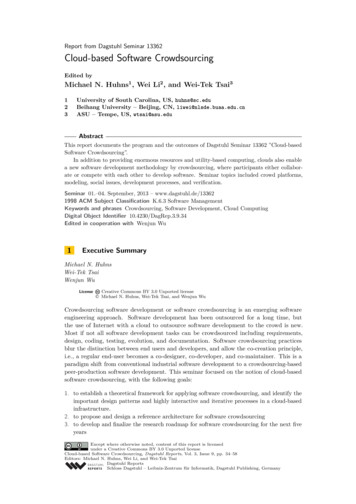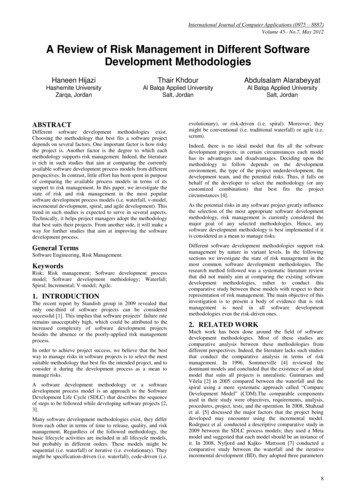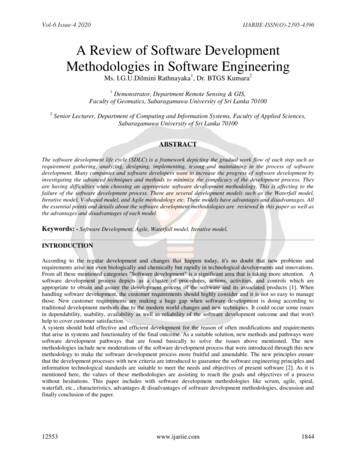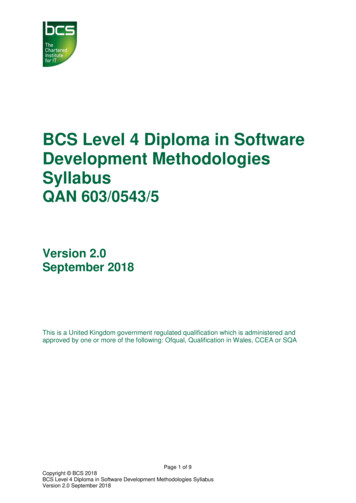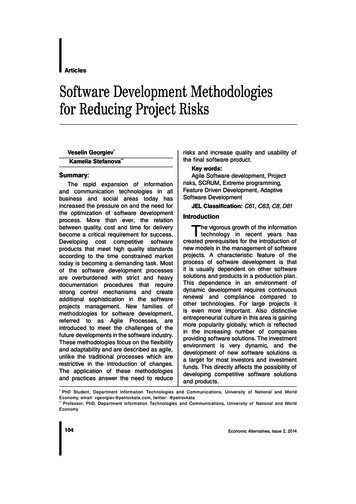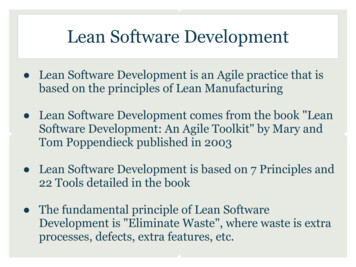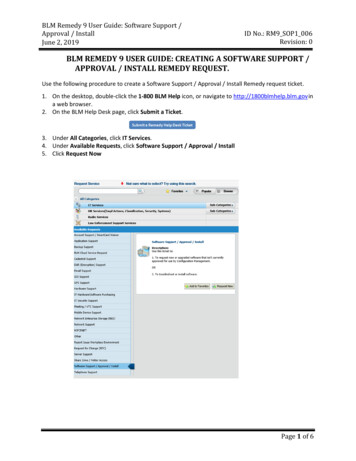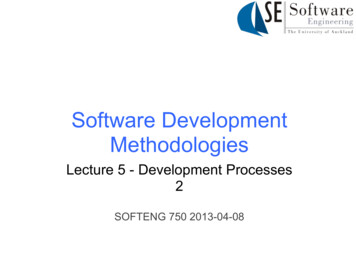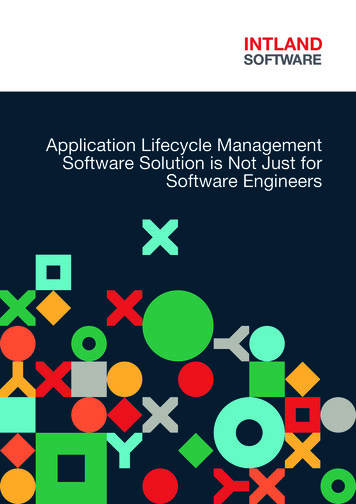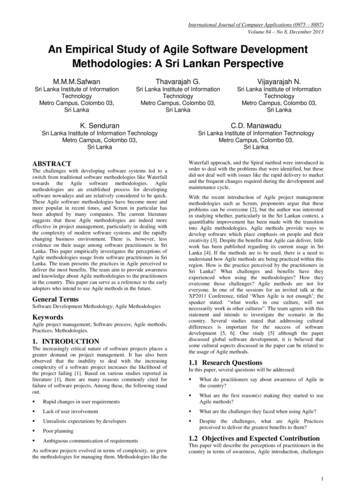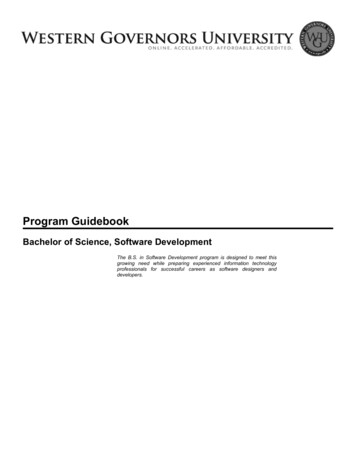
Transcription
Program GuidebookBachelor of Science, Software DevelopmentThe B.S. in Software Development program is designed to meet thisgrowing need while preparing experienced information technologyprofessionals for successful careers as software designers anddevelopers.
Understanding the Competency-Based ApproachPractically speaking, how do competency-based programs like those offered at Western GovernorsUniversity (WGU) work? Unlike traditional universities, WGU does not award degrees based oncompletion of a certain number of credit hours or a certain set of required courses. Instead, you will earnyour degree by demonstrating your skills, knowledge, and understanding of important concepts.Progress through a degree program is governed not by the amount of time you spend in class but by yourability to demonstrate mastery of competencies as you complete required courses. Of course, you willneed to engage in learning experiences as you review competencies or develop knowledge and skills inareas in which you may be weak. To help you acquire the knowledge and skills you need to completeyour courses and program, WGU provides a rich array of learning resources. Your program mentor willwork closely with you to help you understand the competencies required for your program and to help youcreate a schedule for completing your courses. You will also work closely with course instructors as youengage in each of your courses. As subject matter experts, course instructors will guide you through thecontent you must master to pass the course assessments.The benefit of this competency-based system is that enables students who are knowledgeable about aparticular subject to make accelerated progress toward completing a degree, even if they lack collegeexperience. You may have gained skills and knowledge of a subject while on the job, accumulatedwisdom through years of life experience, or already taken a course on a particular subject. WGU willaward your degree based on the skills and knowledge that you possess and can demonstrate—not thenumber of credits hours on your transcript.AccreditationWestern Governors University is the only university in the history of American higher education to haveearned accreditation from four regional accrediting commissions. WGU's accreditation was awarded by(1) the Northwest Commission on Colleges and Universities, (2) the Higher Learning Commission of theNorth Central Association of Colleges and Schools, (3) the Accrediting Commission for Community andJunior Colleges of the Western Association of Schools and Colleges, and (4) the Accrediting Commissionfor Senior Colleges and Universities of the Western Association of Schools and Colleges. The university’saccreditation status is now managed by the Northwest Commission on Colleges and Universities(NWCCU), which reaffirmed WGU’s accreditation in February 2020. The WGU Teachers College isaccredited at the initial-licensure level by the Council for the Accreditation of Educator Preparation(CAEP) and by the Association for Advancing Quality in Educator Preparation (AAQEP). The nursingprograms are accredited by the Commission on Collegiate Nursing Education (CCNE). The HealthInformation Management program is accredited by the Commission on Accreditation for HealthInformatics and Information Management Education (CAHIIM). The College of Business programs areaccredited by the Accreditation Council for Business Schools and Programs (ACBSP).The Degree PlanThe focus of your program is your personalized Degree Plan. The Degree Plan is a detailed blueprint ofthe courses you will need to complete in order to earn your degree. The Degree Plan also lays out theaccompanying learning resources and assessments that compose your program. The list of courses inthe Degree Plan is often referred to as the standard path. The amount of time it takes to complete yourprogram depends on both the amount of new information you need to learn and the amount of time youplan to devote each week to study. Your program mentor and course instructors will help you assess yourstrengths and development needs to establish a study plan.Students vary widely in the specific skills and information they need to learn. For example, some studentsmay be highly knowledgeable in a particular subject matter and would not need to engage in new learningopportunities. Other students may find that portions of the program require them to learn new informationand that they need to take an online class or participate in a study module to acquire the knowledge andskills needed to fulfill program competencies in that area. Some individuals may be able to devote as littleBSITSW 202011 2019 Western Governors University 2/25/212
as 15–20 hours per week to the program, while others may need to devote more time. For this reason,pre-assessments are there to help your program mentor form a profile of your prior knowledge and createa personalized Degree Plan.How You Will Interact with FacultyAt WGU, faculty serve in specialized roles, and they will work with you individually to provide theguidance, instruction, and support you will need to succeed and graduate. As a student, it is important foryou to take advantage of this support. It is key to your progress and ultimate success.Upon your enrollment, you will be assigned a program mentor—an expert in your field of study who willprovide you with regular program-level guidance and support from the day you start until the day yougraduate. Your program mentor will set up regular telephone appointments (weekly at first) with you,which you will be expected to keep. The mentor will review program competencies with you and work withyou to develop a plan and schedule for your coursework. Your program mentor will serve as your mainpoint of contact throughout your program—helping you set weekly study goals, recommending specificlearning materials, telling you what to expect in courses, and keeping you motivated. In addition to regularcalls, your program mentor is available to help you resolve questions and concerns as they arise.You will also be assigned to a course instructor for each course. Course instructors are doctoral-levelsubject matter experts who will assist your learning in each individual course. When you begin a newcourse, your assigned course instructor will actively monitor your progress and will be in touch to offerone-on-one instruction and to provide you with information about webinars, cohort sessions, and otherlearning opportunities available to help you acquire the competencies you need to master the course.Your course instructor can discuss your learning for the course, help you find answers to contentquestions, and give you the tools to navigate the course successfully. In addition, you will communicatewith course instructors by posting in the online learning community and participating in live discussionsessions such as webinars and cohorts.For many of the courses at WGU, you will be required to complete performance assessments. Theseinclude reports, papers, presentations, and projects that let you demonstrate your mastery of the requiredcompetencies. A separate group of faculty members, called evaluators, will review your work todetermine whether it meets requirements. Evaluators are also subject matter experts in their field ofevaluation. If your assessment needs further work before it “passes,” these evaluators, who review yourwork anonymously, will provide you with instructional feedback to help you meet evaluation standardsand allow you to advance.Connecting with Other Mentors and Fellow StudentsAs you proceed through your Degree Plan, you will have direct contact with multiple faculty members.These communications can take a variety of forms, including participation in one-on-one discussions,chats in the learning communities, and live cohort and webinar opportunities. As a WGU student, you willhave access to your own personal MyWGU Student Portal, which will provide a gateway to your coursesof study, learning resources, and learning communities where you will interact with faculty and otherstudents.The learning resources in each course are specifically designed to support you as you developcompetencies in preparation for your assessments. These learning resources may include readingmaterials, videos, tutorials, cohort opportunities, community discussions, and live discussions that areguided by course instructors who are experts in their field. You will access your program communityduring your orientation course to network with peers who are enrolled in your program and to receivecontinued support through professional enrichment and program-specific chats, blogs, and discussions.WGU also provides Student Services associates to help you and your program mentor solve any specialproblems that may arise.OrientationBSITSW 202011 2019 Western Governors University 2/25/213
The WGU orientation course focuses on acquainting you with WGU’s competency-based model, distanceeducation, technology, and other resources and tools available for students. You will also utilize WGUprogram and course communities, participate in activities, and get to know other students at WGU. Theorientation course must be completed before you can start your first term at WGU.Transferability of Prior College CourseworkBecause WGU is a competency-based institution, it does not award degrees based on credits but ratheron demonstration of competency. However, if you have completed college coursework at anotheraccredited institution, or if you have completed industry certifications, you may have your transcripts andcertifications evaluated to determine if you are eligible to receive some transfer credit. The guidelines fordetermining what credits will be granted varies based on the degree program. Students entering graduateprograms must have their undergraduate degree verified before being admitted to WGU. To review moreinformation in regards to transfer guidelines based on the different degree programs, you may visit theStudent Handbook found at the link below and search for “Transfer Credit Evaluation.”Click here for the Student HandbookWGU does not waive any requirements based on a student's professional experience and does notperform a "résumé review" or "portfolio review" that will automatically waive any degree requirements.Degree requirements and transferability rules are subject to change in order to keep the degree contentrelevant and current.Remember, WGU's competency-based approach lets you take advantage of your knowledge and skills,regardless of how you obtained them. Even when you do not directly receive credit, the knowledge youpossess may help you accelerate the time it takes to complete your degree program.Continuous Enrollment, On Time Progress, and Satisfactory AcademicProgressWGU is a “continuous enrollment” institution, which means you will be automatically enrolled in each ofyour new terms while you are at WGU. Each term is six months long. Longer terms and continuousenrollment allow you to focus on your studies without the hassle of unnatural breaks between terms thatyou would experience at a more traditional university. At the end of every six-month term, you and yourprogram mentor will review the progress you have made and revise your Degree Plan for your next sixmonth term.WGU requires that students make measurable progress toward the completion of their degree programsevery term. We call this “On-Time Progress,” denoting that you are on track and making progress towardon-time graduation. As full-time students, graduate students must enroll in at least 8 competency unitseach term, and undergraduate students must enroll in at least 12 competency units each term.Completing at least these minimum enrollments is essential to On-Time Progress and serves as abaseline from which you may accelerate your program. We measure your progress based on the coursesyou are able to pass, not on your accumulation of credit hours or course grades. Every time you pass acourse, you are demonstrating that you have mastered skills and knowledge in your degree program. Forcomparison to traditional grading systems, passing a course means you have demonstrated competencyequivalent to a “B” grade or better.WGU assigns competency units to each course in order to track your progress through the program. Acompetency unit is equivalent to one semester credit of learning. Some courses may be assigned 3competency units while others may be as large as 12 competency units.Satisfactory Academic Progress (SAP) is particularly important to students on financial aid because youmust achieve SAP in order to maintain eligibility for financial aid. We will measure your SAP quantitativelyby reviewing the number of competency units you have completed each term. In order to remain in goodBSITSW 202011 2019 Western Governors University 2/25/214
academic standing, you must complete at least 66.67% of the units you attempt over the length of yourprogram—including any courses you add to your term to accelerate your progress. Additionally, duringyour first term at WGU you must pass at least 3 competency units in order to remain eligible for financialaid. We know that SAP is complex, so please contact a financial aid counselor should you have additionalquestions. *Please note: The Endorsement Preparation Program in Educational Leadership is not eligiblefor federal financial aid.CoursesYour Degree Plan includes courses needed to complete your program. To obtain your degree, you will berequired to demonstrate your skills and knowledge by completing the assessment(s) for each course. Ingeneral there are two types of assessments: performance assessments and objective assessments.Performance assessments contain, in most cases, multiple scored tasks such as projects, essays, andresearch papers. Objective assessments include multiple-choice items, multiple-selection items,matching, short answer, drag-and-drop, and point-and-click item types, as well as case study and videobased items. Certifications verified through third parties may also be included in your program. Moredetailed information about each assessment is provided in each course of study.Learning ResourcesWGU works with many different educational partners, including enterprises, publishers, trainingcompanies, and higher educational institutions, to provide high-quality and effective learning resourcesthat match the competencies you are developing. These vary in type, and may be combined to create thebest learning experience for your course. A learning resource can be an e-textbook, online module, studyguide, simulation, virtual lab, tutorial, or a combination of these. The cost of most learning resources areincluded in your tuition and Learning Resource Fee. They can be accessed or enrolled for through yourcourses. Some degree-specific resources are not covered by your tuition, and you will need to coverthose costs separately. WGU also provides a robust library to help you obtain additional learningresources, as needed.Mobile Compatibility:The following article provides additional details about the current state of mobile compatibility for learningresources at WGU. It includes a list that can be referenced to determine the mobile friendliness of all corecourse materials used in a program.Student Handbook article: Can I use my mobile device for learning resources?Standard PathAs previously mentioned, competency units (CUs) have been assigned to each course in order tomeasure your academic progress. If you are an undergraduate student, you will be expected to enroll in aminimum of 12 competency units each term. Graduate students are expected to enroll in a minimum of 8competency units each term. A standard plan for a student for this program who entered WGU withoutany transfer units would look similar to the one on the following page. Your personal progress can befaster, but your pace will be determined by the extent of your transfer units, your time commitment, andyour determination to proceed at a faster rate.BSITSW 202011 2019 Western Governors University 2/25/215
Standard Path for Bachelor of Science, Software DevelopmentCourse DescriptionCUsTermIntroduction to IT41Scripting and Programming - Foundations31Introduction to Communication31English Composition I31Technical Communication32Applied Probability and Statistics32Critical Thinking and Logic32Web Development Foundations32Integrated Physical Sciences33Network and Security - Foundations33Applied Algebra33IT Foundations43IT Applications44Data Management - Foundations34Introduction to Humanities34Business of IT - Project Management44Introduction to Geography35Scripting and Programming - Applications45American Politics and the US Constitution35Business of IT - Applications45Ethics in Technology36Data Management - Applications46Data Structures and Algorithms I46Software Engineering46Organizational Behavior and Leadership37Web Development Applications67Software I67User Interface Design48User Experience Design38Software II - Advanced Java Concepts68Software Quality Assurance39Mobile Application Development39Advanced Data Management39Software Development Capstone49Changes to CurriculumBSITSW 202011 2019 Western Governors University 2/25/216
WGU publishes an Institutional Catalog, which describes the academic requirements of each degreeprogram. Although students are required to complete the program version current at the time of theirenrollment, WGU may modify requirements and course offerings within that version of the program tomaintain the currency and relevance of WGU’s competencies and programs. When programrequirements are updated, students readmitting after withdrawal from the university will be expected tore-enter into the most current catalog version of the program.BSITSW 202011 2019 Western Governors University 2/25/217
Areas of Study for Bachelor of Science, Software DevelopmentThe following section includes the areas of study in the program, with their associated courses. Yourspecific learning resources and level of instructional support will vary based on the individualcompetencies you bring to the program and your confidence in developing the knowledge, skills, andabilities required in each area of the degree. The Degree Plan and learning resources are dynamic, soyou need to review your Degree Plan and seek the advice of your mentor regarding the resources beforeyou purchase them.IT FundamentalsIntroduction to ITIntroduction to IT examines information technology as a discipline and the various roles and functions of the IT departmentas business support. Students are presented with various IT disciplines including systems and services, network andsecurity, scripting and programming, data management, and business of IT, with a survey of technologies in every area andhow they relate to each other and to the business.This course covers the following competencies: Begin your course by discussing your course planning tool report with your instructor and creating your personalizedcourse plan together. The graduate describes IT as a discipline and discusses the history and future of computing as well as the currentlyused infrastructure. The graduate describes information technology systems and their role in converting data to organizational knowledge. The graduate identifies the role of different types of software in a computing environment and explains thefundamentals of software development. The graduate recognizes and describes functions of basic computer hardware components. The graduate describes the structure, function, and security associated with networks. The graduate identifies common software architectures, development techniques, and the relationship betweensoftware and its environment. The graduate explains the structure and function of databases. The graduate explains the role of technology in today’s business environment and describes basic concepts of projectmanagement. The graduate evaluates ethical concerns involved in the use of technology.IT FoundationsIT Foundations is the first course in a two-part series preparatory for the CompTIA A exam, Part I. Students will gain anunderstanding of personal computer components and their functions in a desktop system; computer data storage andretrieval; classifying, installing, configuring, optimizing, upgrading, and troubleshooting printers, laptops, portable devices,operating systems, networks, and system security; recommending appropriate tools, diagnostic procedures, preventativemaintenance and troubleshooting techniques for personal computer components in a desktop system; strategies foridentifying, preventing, and reporting safety hazards and environmental/human accidents in a technological environments;and effective communication with colleagues and clients as well as job-related professional behavior.This course covers the following competencies: Begin your course by discussing your course planning tool report with your instructor and creating your personalizedcourse plan together. The graduate configures client-side virtualization to meet organizational requirements. The graduate determines appropriate diagnostic and repair strategies for common personal computer hardware,access to network resources, and network connectivity. The graduate recommends appropriate strategies for classifying, installing, configuring, optimizing, upgrading, andtroubleshooting laptops and mobile devices. The graduate recommends appropriate strategies for classifying, installing, configuring, optimizing, and upgradingbasic network types. The graduate demonstrates an understanding of personal computer components and their function in a desktopBSITSW 202011 2019 Western Governors University 2/25/218
system.IT ApplicationsIT Applications is a continuation of the IT Foundations course preparatory for the CompTIA A exam, Part II. Students willgain an understanding of personal computer components and their functions in a desktop system. Also covered is computerdata storage and retrieval including classifying, installing, configuring, optimizing, upgrading, and troubleshooting printers,laptops, portable devices, operating systems, networks, and system security. Other areas include recommendingappropriate tools, diagnostic procedures, preventative maintenance, and troubleshooting techniques for personal computercomponents in a desktop system. The course then finishes with strategies for identifying, preventing, and reporting safetyhazards and environmental/human accidents in a technological environment, and effective communication with colleaguesand clients as well as job-related professional behavior. This course builds on the understanding of hardware from ITFoundations and is designed to build the skills to support 4 core components: Operating Systems, Security, SoftwareTroubleshooting, and Operational Procedures. These are core competencies for IT professionals from cloud engineers todata analysts, and will empower you with a better understanding of the tools used during your career. The following courseis a prerequisite: C393 IT Foundations.This course covers the following competencies: Begin your course by discussing your course planning tool report with your instructor and creating your personalizedcourse plan together. The graduate determines appropriate tools, diagnostic procedures, preventive maintenance, security, malwareremoval, and troubleshooting techniques for common personal computer and mobile operating systems (mobile andpersonal computer) and applications. The graduate determines appropriate strategies to implement documentation, change management and disasterrecovery, and explain common safety, environmental concerns; explain addressing prohibited content; use professionalcommunication techniques. The graduate determines appropriate strategies for classifying, installing, configuring, optimizing, upgrading, andtroubleshooting computer operating systems. The graduate determines appropriate strategies for classifying, controlling access, setting permission, configuring,optimizing, and upgrading basic system security.Scripting and ProgrammingScripting and Programming - FoundationsScripting and Programming - Foundations provides an introduction to programming, covering basic elements such asvariables, data types, flow control, and design concepts. The course is language-agnostic in nature, ending in a survey oflanguages and introduces the distinction between interpreted and compiled languages. There are no prerequisites for thiscourse.This course covers the following competencies: Begin your course by discussing your course planning tool report with your instructor and creating your personalizedcourse plan together. The graduate examines basic computer programming elements, including data types, constants, variables, operators,and expressions. The graduate determines how to achieve programming goals through functions and control structure. The graduate interprets algorithms. The graduate describes steps of the software design process. The graduate compares various scripting and programming languages.General EducationIntroduction to CommunicationThis introductory communication course allows candidates to become familiar with the fundamental communication theoriesand practices necessary to engage in healthy professional and personal relationships. Candidates will survey humancommunication on multiple levels and critically apply the theoretical grounding of the course to interpersonal, intercultural,small group, and public presentational contexts. The course also encourages candidates to consider the influence oflanguage, perception, culture, and media on their daily communicative interactions. In addition to theory, candidates willBSITSW 202011 2019 Western Governors University 2/25/219
engage in the application of effective communication skills through systematically preparing and delivering an oralpresentation. By practicing these fundamental skills in human communication, candidates become more competentcommunicators as they develop more flexible, useful, and discriminatory communicative practices in a variety of contexts.Note: There are references within this video to Taskstream. If Taskstream is not part of your student experience, pleasedisregard, and locate your task(s) within your course.This course covers the following competencies: Begin your course by discussing your course planning tool report with your instructor and creating your personalizedcourse plan together. The graduate applies foundational elements of effective communication. The graduate applies appropriate communication strategies in interpersonal and group contexts. The graduate utilizes appropriate presentational communication strategies in personal and professional settings.English Composition IEnglish Composition I introduces candidates to the types of writing and thinking that are valued in college and beyond.Candidates will practice writing in several genres with emphasis placed on writing and revising academic arguments.Instruction and exercises in grammar, mechanics, research documentation, and style are paired with each module so thatwriters can practice these skills as necessary. Composition I is a foundational course designed to help candidates preparefor success at the college level. There are no prerequisites for English Composition I.This course covers the following competencies: Begin your course by discussing your course planning tool report with your instructor and creating your personalizedcourse plan together. The graduate applies appropriate grammatical rules, sentence structure, and writing conventions. The graduate selects appropriate rhetorical strategies that improve writing and argumentation. The graduate appropriately uses a given writing style. The graduate uses appropriate writing and revision strategies. The graduate integrates credible and relevant sources into written arguments. The graduate composes an appropriate narrative for a given context. The graduate composes an appropriate argumentative essay for a given context.Applied Probability and StatisticsApplied Probability and Statistics helps candidates develop competence in the fundamental concepts of basic statisticsincluding introductory algebra and graphing; descriptive statistics; regression and correlation; and probability. Statistical dataand probability are used in everyday life, science, business, information technology, and educational settings to makeinformed decisions about the validity of studies and the effect of data on decisions. This course discusses what constitutessound research design and how to appropriately model phenomena using statistical data. Additionally, the content coverssimple probability calculations based on events that occur in the business and IT industries. No prerequisites are requiredfor this course.This course covers the following competencies: Begin your course by discussing your course planning tool report with your instructor and creating your personalizedcourse plan together. The graduate applies the operations, processes, and procedures of fractions, decimals, and percentages to evaluatequantitative expressions. The graduate applies the operations, processes, and procedures of basic algebra to evaluate quantitative expressions,and to solve equations and inequalities. The graduate evaluates categorical and quantitative data pertaining to a single variable using appropriate graphicaldisplays and numerical measures. The graduate evaluates the relationship between two variables through interpretation of visual displays and numericalmeasures. The graduate evaluates the relationship between two quantitative variables through correlation and regression. The graduate applies principles and methods of probability-based mathematics to explain and solve problems.BSITSW 202011 2019 Western Go
(CAEP) and by the Association for Advancing Quality in Educator Preparation (AAQEP). The nursing programs are accredited by the Commission on Collegiate Nursing Education (CCNE). The Health Information Management program is accredited by the Commission on Accreditation for Health Informatics and Information Management Education (CAHIIM).

